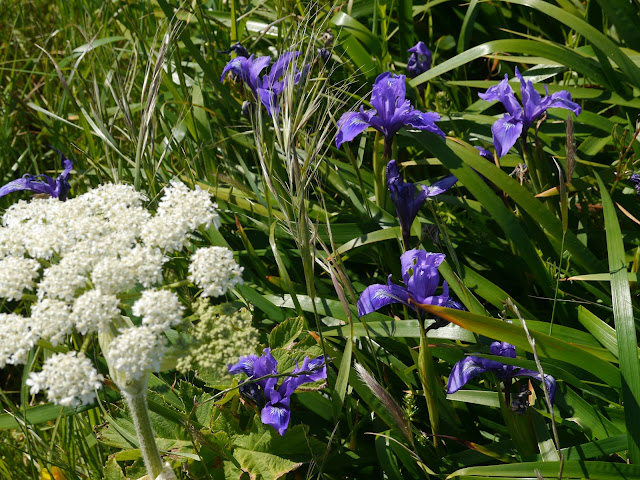Today, I rose early, made a thermos of tea, and drove north to sit among the tule elk cows on Beltane morning. I'm not sure why this need washed over me so fully, but I wanted to be near them, wise ladies with their growing calves.
I found the world out there warm and languid, the irises a deep and luscious purple, the elk cows napping amidst them, chewing their cud. Not a wind, and the ocean thundering.
I wanted to heap blessings on these elk mamas in the growing spring. If you look closely on the right hand side of the photo, you will see two fuzzy lighter ears sticking up from the grass-- a very young calf! One of the cows watched me very closely as I sat down among the irises. I wanted to cry at the beauty of their tawny bodies, their dark eyes, their grazing big-eared grace. I remembered something
David Abram wrote in his Becoming Animal, about easing the nervousness of wild ones with singing, or humming-- you can communicate so much more to another creature that way. Your intentions, the state of your body, they can all be detected in the vibrations of your voice. So I whistled as I sat by the side of the road at 8:00 am with the elk ladies, and then I sang a song, and they watched me very intently, very alert, ears big and pointed, but they did not move, though I was but 15 feet away. It felt so good, so natural, so enlivening, though it is not something I do often—to sit and sing to elk.
When I turned, I found more behind me, on the other side of the road, peering at my strange whistling. What an odd creature I must have been to them!
Eventually I tried to sneak out my thermos of tea and my cup, but they would have none of my fiddling around, silly human, and the one who had been watching me most closely led the way, off to quieter dreaming-ground.
I can only say that the grace of their gazes upon me felt ancient, and holy. It went right into my bones. It went right into my womb. It felt like medicine: the gaze of the sacred elk (or deer, reindeer, moose, camel)—sustenance, wild god, source of life—when it rests gently upon you, stirs up some kind of ancient sacramental bond. We do not
need to hunt elk or deer here now, for our survival. But maybe we still need, for the survival of our wild souls, to shimmy close to them, to eye each other, to remember one another's faces. To exchange a song.
Just up the road, I climbed a hill near an old watertank by the historic structures of Pierce Point Ranch (now home to barn swallows). I had my tea, I looked out at Tomales Bay (a big blue ribbon-scar marking the San Andreas Fault), I lay in the sun and I wondered at the dreams of Point Reyes, this land moving and moving along the North American plate, never truly at rest.
Everything felt dreamy, bursting, like these little lupine pods, with potential magic; Beltane, day of honoring the growth of plants, the good health of herds, the fertility of land and people & love, day when the veils are thin and wild ones wander in, translucent and horned—this day was a warm wind upon the land, a heady hot silence and stillness across hills normally blustering with ocean winds or fog. Together, we dreamed a little while.
May the irises, the cow parsnips and wild radishes of your dreams grow beautifully toward the sun and flower with all of their essential richness. May your wild elk soul wander truly, finding just the right grasses and sweet tubers, the perfect places to lay, to chew the cud, to dream whatever the land dreams beneath its hooves.
Here's a poem, which I read this morning out on the back steps, to honor all the little nest-builders flying about us as the spring grows. It seems to suit the day....
may my heart always be open to little
birds who are the secrets of living
whatever they sing is better than to know
and if men should not hear them men are old
may my mind stroll about hungry
and fearless and thirsty and supple
and even if it’s sunday may i be wrong
for whenever men are right they are not young
and may myself do nothing usefully
and love yourself so more than truly
there’s never been quite such a fool who could fail
pulling all the sky over him with one smile
- e.e. cummings


























